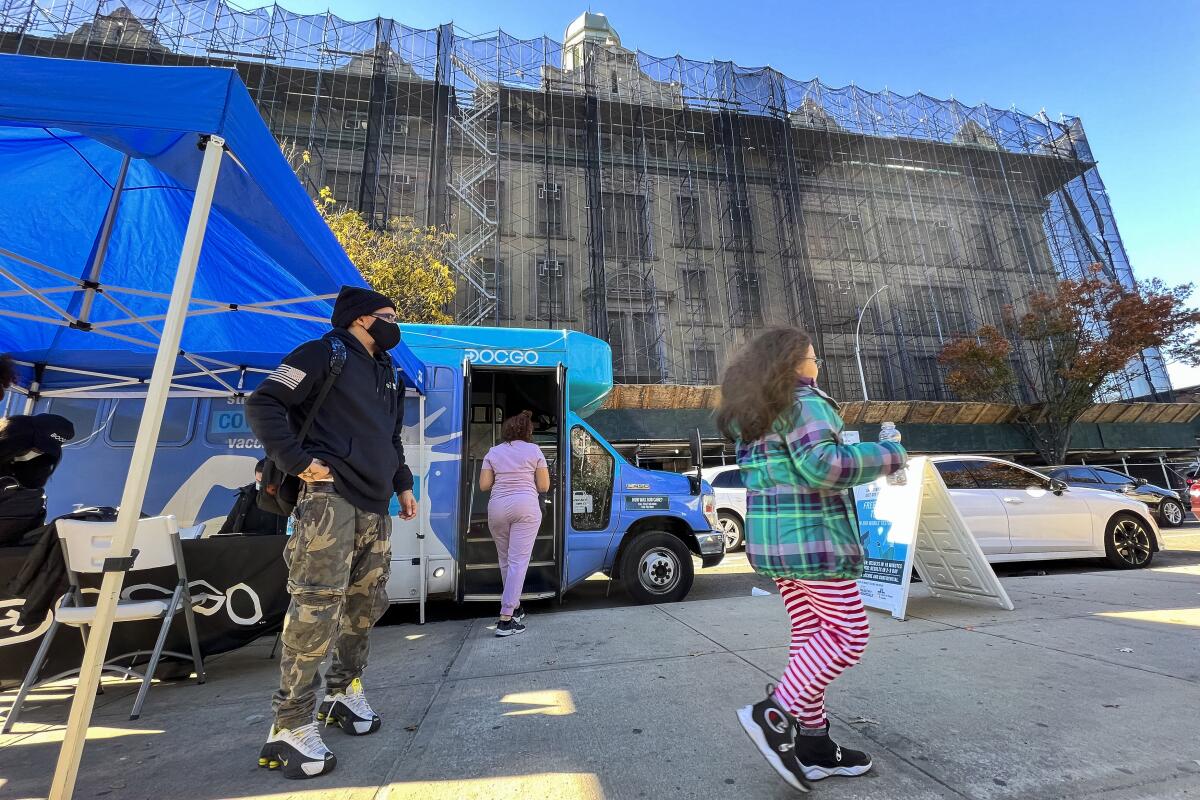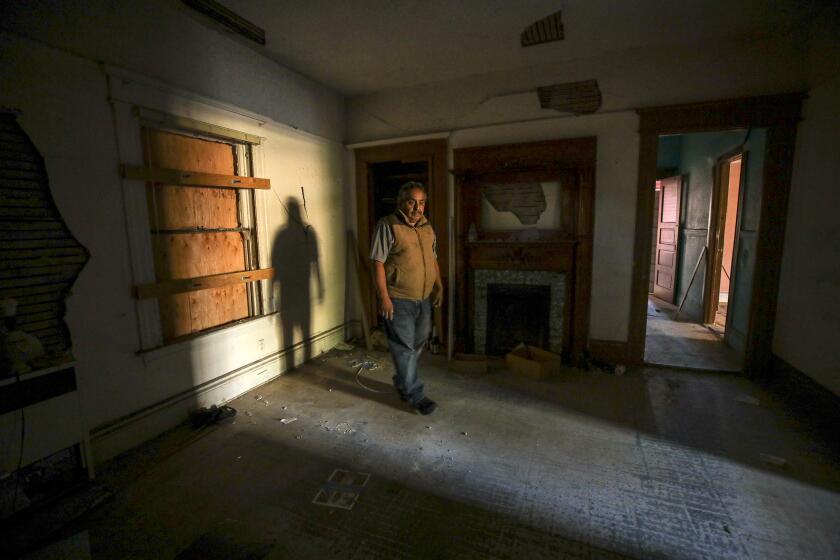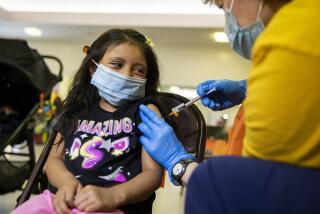Schools take lead role in promoting vaccines for youngsters

With the approval of the COVID-19 vaccine for younger children, many elementary schools around the U.S. are preparing to offer the shots, which educators see as key to keeping students learning in person and making the classroom experience closer to what it once was.
Some district leaders say offering vaccine clinics on campus, with the involvement of trusted school staff, is key to improving access and helping overcome hesitancy â particularly in communities with low overall vaccination rates.
Still, many school systems are choosing not to offer elementary schools as hosts for vaccination sites after some middle and high schools that offered shots received pushback.
More than 250 families signed up for vaccinations that began Thursday at elementary schools in Duluth, Minn., which organized clinics immediately after the Centers for Disease Control and Prevention gave the final sign-off to Pfizerâs kid-size COVID-19 shot for children ages 5 to 11. Supt. John Magas called the vaccines a âgame-changer.â
âThis brings us one step closer to moving from pandemic to endemic,â Magas said. âIt allows us to reconsider things like social distancing and masking and things like that as safety permits.â
The explosionâs aftermath underscored a painful truth about life in Los Angeles, a region where formerly working-class neighborhoods are rapidly gentrifying as the population grows but the available housing stock does not.
The Biden administration plans to send a letter to U.S. elementary schools in the next week asking them to host clinics. The Education Department is also urging schools to host town halls and webinars at which parents can talk to doctors about the vaccine.
Districts that have held or are planning clinics for younger children span Alaska to Vermont, said Hayley Meadvin, an Education Department senior advisor. Where schools choose not to host clinics, families can turn to doctorâs offices, hospitals and other sites.
âThere are many points of access, and thereâs no wrong door, honestly,â Meadvin said.
In Ohio, some school districts offered on-site clinics for older students, but Rick Lewis, director of the Ohio School Boards Assn., said he hasnât heard from any districts planning them for younger students. He noted the CDC encourages districts to consider factors like local needs for school clinics and adequate community support.
School vaccine drives have faced pushback and protests in Ohio and elsewhere, and some opponents say they plan to keep up pressure as the focus of the vaccination effort shifts to younger students.
Sarah Kenney, who represents the group Mainers for Health and Parental Rights, argues that schools should not be involved or even talking to young children about the vaccine. She worries about its newness and potential for long-term side effects.
A Pfizer study of 2,268 children found the vaccine was almost 91% effective at preventing symptomatic COVID-19 infections. The FDA examined 3,100 vaccinated kids in concluding the shots are safe.
Kenney also expressed concern about a stigma against children who do are not vaccinated.
âThese conversations and personal decisions have been difficult enough to navigate for adults, we shouldnât be putting this on our kids,â she said.
Parents are required to give authorization for their childrenâs shots. The vaccines are typically administered before or after school in partnerships with local hospitals and government health officials.
Chicago Public Schools, the countryâs third-largest district, canceled school Nov. 12 to give parents an opportunity to have their children vaccinated by a healthcare provider or at a school-based site.
In Portland, Ore., vaccines will be offered in eight elementary schools starting next week in high-poverty districts, where families are more likely to face barriers such as access to healthcare or transportation, Supt. Guadalupe Guerrero said.
On the heels of Californiaâs decision to make vaccines for children mandatory, Portland is among districts considering the same. A recent board of education meeting to discuss that possibility was disrupted by a group of protesters. For that reason, security will be present at the vaccine clinics, and their times and dates wonât be publicized outside the local community, said Courtney Westling, the districtâs director of government relations.
âSchools are a trusted community hub,â she said. âFamilies, in general, feel very safe at these school sites. Weâre also not asking for identification or insurance cards. We donât want people to fear ICE showing up or something. We are just trying to get people vaccinated so we can get some of this behind us and get back to some semblance of normalcy.â
In Hartford, Conn., schools Supt. Leslie Torres-Rodriguez said the vaccination clinics the district is planning along with local hospitals will include school nurses, trusted by families. Only a third of the districtâs students 12 and older are vaccinated.
âWe take an equity stance here and think about the access and removing any barriers that our families might have,â she said.
In nearby Tolland, Conn., school Supt. Walter Willett said his district also is teaming with health providers, including UConn Health, to offer vaccines at school sites to younger students. He said vaccines are important, not just for keeping kids in school, but for teachers, janitors and other staff who tend to be more at risk.
âThey can more effectively do their job when kids arenât bouncing in and out of the classroom in quarantine,â he said.
Liz Hamel, the vice president of opinion and survey research at KFF, a nonprofit that studies healthcare issues, said its recent surveys show parents are more likely to accept vaccine information from their pediatrician than from government or educational sources.
âAnd one thing we found with teens is that most parents didnât want their school to require the vaccine, but if their school provided information or encouraged students to get vaccinated, those parents were more likely to say that their child was getting the vaccine,â she said.
Sam Valle, a 9-year-old in Old Saybrook, Conn., said heâs been bugging his parents for months, asking when he can get the vaccine.
âRight now, I canât go into a restaurant without it,â he said. âI canât go into a store without wearing a mask. I canât do a lot of things.â
Samâs quest will soon be over. His mother says his shot is now scheduled for Wednesday.
___
Associated Press writers Collin Binkley in Boston and Michael Melia in Hartford, Conn., contributed to this report.
More to Read
Sign up for Essential California
The most important California stories and recommendations in your inbox every morning.
You may occasionally receive promotional content from the Los Angeles Times.











